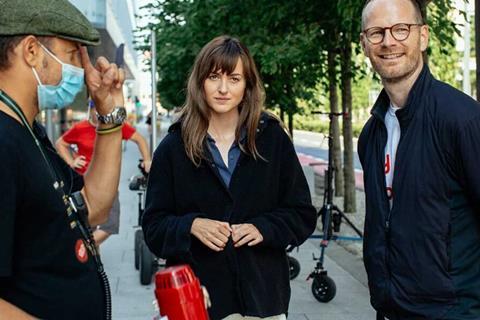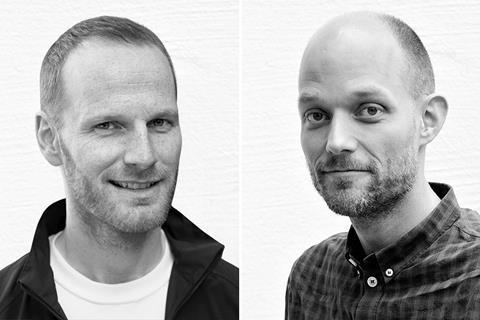They met three decades ago and have been friends and collaborators ever since, including co-writing multiple Oscar and Bafta nominee The Worst Person In The World. Screen talks to Norwegian filmmaking duo Joachim Trier and Eskil Vogt.

What is now an Oscar-nominated writing collaboration on The Worst Person In The World had much more humble beginnings: Norway’s Joachim Trier and Eskil Vogt met when they were in their late teens in the early 1990s as they were just trying to find their way into the industry. “We both had the lowest possible job in Norwegian television,” Vogt remembers, “which was taking care of the camera cables for a light-entertainment quiz show that aired on Saturday nights.”
Thankfully they both realised they had passions and ambitions beyond that wiring. “We both not only loved movies but we wanted to make movies, and we didn’t have any friends who shared that ambition back then,” Vogt recalls. “And at that time in your life, you can go from being strangers to best friends in a few days… we just hung out watching movies and talking about books and everything for a few years before we started making short films together.” They would visit Oslo’s arthouse Cinemateket and swap VHS copies of Fellini or Buñuel films they recorded from Norwegian TV.
The pair’s early short films together started in 1995 with Trier’s Fatal Strategies, before Trier went off to study directing at the European Film College in Denmark and later at the National Film and Television School in the UK, where he corralled the co-writing help of his friend for three shorts: Pieta, Still and Procter. Meanwhile, Vogt went off to study directing at La Fémis in Paris. Since then, they have collaborated on the scripts for all five of Trier’s features: Reprise; Oslo, August 31st; Louder Than Bombs; Thelma; and, most recently, The Worst Person In The World.
The latter, an “existential romantic comedy”, is the story of Julie (Renate Reinsve, winner of the best actress prize in Cannes last year), a twenty-something woman in Oslo trying to figure out what she wants from her life, career and love, and navigating relationships with Aksel (Anders Danielsen Lie) and Eivind (Herbert Nordrum). The film is nominated for two Oscars (international feature and original screenplay) and two Baftas (film not in the English language, and actress for Reinsve).
Equal partnership

Trier says part of the reason they work as collaborators is that they are true “co-writers”, not just in name. Vogt is also an acclaimed director in his own right, with credits including Sundance 2014 screenwriting award winner Blind and supernatural thriller The Innocents (which was selected for Cannes’ Un Certain Regard in 2021, meaning Vogt had the rare honour of being on the Croisette with two films).
The fact they both direct makes a huge difference in the way they write, Trier says. “We are two writers in a room together, but we’re both very concerned with the formal aesthetics of telling stories through the camera and thinking about that already in the writing room.”
Over the years they have honed the collaborative process in a way that some might see as unconventional, but it works well for them. They might spend a few months in their shared Oslo office talking about ideas (and life) without any rush to shape a storyline. “That’s the main part of the process, actually,” says Vogt, “just dreaming up ideas, concepts, trying to see if they fit together at some point.
“We talk more about life instead of doing what people would call working. Then things always start to fit together, and suddenly we think, ‘Oh this is a movie! This is a story! This is a character!’”
Taking detailed notes, they map out an idea on a huge corkboard and then try to figure it out scene by scene, with Vogt going away and writing each scene individually, and the pair coming back together to go through it all again. “At this stage, we’re talking mostly every day and I give feedback,” says Trier. “Then there’s usually a moment halfway through where we reconfigure something, structurally.
“We take away that expectation that you have a pitch line and a synopsis before you write the script,” continues Trier. “We’re not like that, we’re messy. We lose faith, we gain faith again, we stick together as friends and then there’s an important moment when Eskil has that first draft with some notes from me that we also do a sit-down read-through — and then we go into another very important phase, which is to go through and redraft everything. That’s when we go deep into it for a few weeks or months.”
Only at this point are they ready to share the script with other key collaborators, such as the actors. Trier records the rehearsals and then Vogt comes back into it and, as the director explains, “We discuss how we can nuance specifics — maybe we can add something because the rehearsals included some ad-libbing. There’s always this redraft after I’ve done rehearsals, which just makes the script fit better.”
The magic finally comes together during the shoot, of course. “I think Renate’s input daily in front of the camera is where she really shaped the material the most and made it live,” says Trier. “She also had a lot of ideas about reactions — we don’t write all the reactions.”
The pair do not shy away from the tricky question that, with The Worst Person In The World, they are two men writing a female lead character. “I went to [film theorist] Laura Mulvey seminars when I was 19 because I was a film nerd,” says Trier. “I am very aware of the dialogue of male gaze. I grew up in a feminist household with a mother who made documentaries about women’s liberation in Zimbabwe when I was a kid. So I do care for that conversation.
“There are many ways of attacking this interesting subject of gender and writing and creativity. We try our best to be good observers of life. We then have to find our connection to our characters, and then slowly the character becomes an entity of its own and it becomes liberating to feel some of those differences,” Trier continues.
“To take a personal example, I feel I’ve known a few Julies in my life. I have also been in a relationship early on where I did not want children. I’ve also been in a relationship later in my life where I did want children. You experience subject matters, themes, emotions from different angles. And the whole clue is to allow yourself to use that creatively. That to me is art. It’s trying to find truthfulness through construct.”
Vogt adds that the pair’s writing frequently looks at characters who are more ambivalent. “We’re not interested in the classical action hero — the idea that your character is defined by what they do,” he says. “We often find that our characters are defined by what they don’t do, the reasons why they don’t do it. The challenge for us as filmmakers is to get inside their heads.”
The duo are currently wondering which heads they will get into next. Even during the busy awards season (and with Vogt preparing for the US and UK rollout of The Innocents in May), they find time to spend days in the office figuring things out together. “That’s always a joy,” Trier says. “To just make sure for our sanity that we keep talking passionately about ideas that have come up.
“My phone is filled with notes of many stupid ideas, because I just want to talk to Eskil about them,” he continues. “We’ve started that journey and we don’t know what the next project exactly is. But we know that we’re curious to keep exploring characters and to do what we do.”






![The Brightest SunScreen[Courtesy HKIFF]](https://d1nslcd7m2225b.cloudfront.net/Pictures/274x183/3/5/0/1448350_thebrightestsunscreencourtesyhkiff_312678.jpg)


















No comments yet